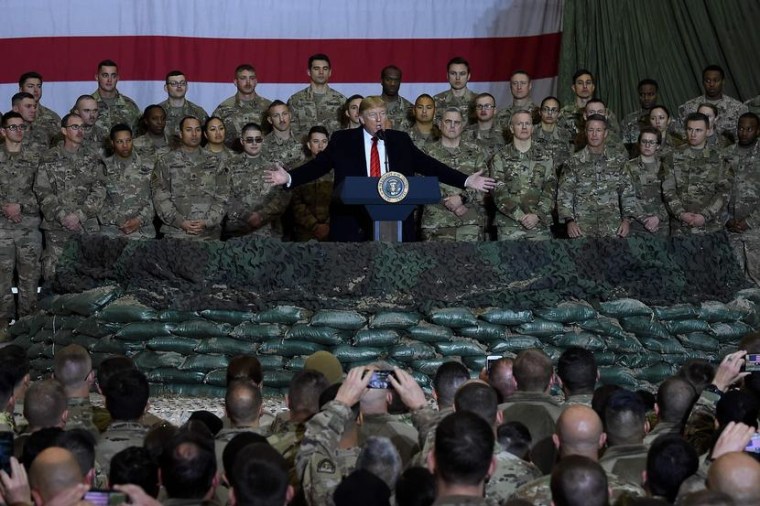On Friday afternoon, Donald Trump removed Lt. Col. Alexander Vindman from his White House job, as part of a legally dubious retaliation for Vindman following the rules during the president's impeachment process. A day later, Trump turned to Twitter to criticize news organizations -- including my employer -- whom he accused of "talking about 'Lt. Col.' Vindman as though I should think only how wonderful he was."
Writing in The Atlantic, Ben Wittes reacted in a way that rang true.
[Vindman was not in] a political position. He is an active military officer, rotating through the NSC on assignment. The president can put quotation marks around lieutenant colonel, as he did in today's tweets, in an effort to demean Vindman's service, but there is nothing to demean about his service, which has been in all respects honorable.
The conduct for which his career has been attacked, what the president calls Vindman's "insubordination," was exceptionally brave truth-telling -- both in real time and later when Congress sought to hear from him. When that happened, Vindman did not shrink from the obligation to say what had happened.
Lt. Col. Vindman -- not "Lt. Col." Vindman -- did everything right. The decorated war hero served honorably, both on the battlefield and as part of the White House National Security Council, and instead of honoring his service, Trump has mocked him in private and derided his military rank in public.
It's a dynamic that's almost hard to believe. As Vox's Aaron Rupar put it, "The guy who received a draft deferment because of bone spurs has the gall to denigrate the service of a Purple Heart recipient."
But as jarring as this was, and as difficult as it is to imagine other presidents getting away with this sort of behavior, what's especially unsettling is the degree to which it's familiar. Trump's willingness to demean those who wear the uniform has become a bizarre staple of his political career.
As regular readers know, there were hints along these lines before Trump took office. Ahead of the 2016 election, the then-candidate mocked prisoners of war – he likes soldiers “who weren’t captured” – lied about his financial support for veterans’ charities, claimed more than once that he understood counter-terrorism better than American generals, and publicly feuded with a Gold Star family.
But as president, Trump has become even more aggressive on this front, blaming military leaders for failed missions he approved, and deriding the former commander of the U.S. Special Operations Command for the speed with which he oversaw the 2011 raid that killed Osama bin Laden.
Trump has also reportedly lashed out at generals privately as "a bunch of dopes and babies," while publicly going on the offensive against his own former Defense secretary, James Mattis -- whom he accused of acting like a "Democrat" for questioning the White House's less-defensible national security moves -- including a tweet in which Trump asserted that the retired four-star general didn't care about foreign allies taking advantage of the United States.
More recently, Trump downplayed the importance of troops with traumatic brain injuries, which prompted a request for an apology from the Veterans of Foreign Wars -- an appeal the president appears to have ignored.
Part of the problem is the Republican's unfortunate past in this area, and the eagerness with which the president has suggested that he's something akin to a great American warrior. As a candidate, Trump liked to say he “felt” like he’d served in the military because his parents sent him to a military-themed boarding school as a teenager. He went so far as to boast that his expensive prep school gave him “more training militarily than a lot of the guys that go into the military.”
It matters, of course, that the claims were ridiculously wrong, but it matters just as much that Trump believed that they were true -- to the extent that he feels he has the credibility to go after servicemen like Vindman.
It's important to emphasize that Trump isn't required to respect military service. If he wants to disparage those who wear the uniform or denigrate their sacrifices, that's his business. It's a free country -- so free that he can take cheap shots at war heroes if he wants to. In the United States, even a president can insult servicemembers, veterans, and their families.
But this speaks to an inconvenient aspect of Trump's vision. As we've discussed before, it’s apparently never occurred to him to appreciate the distinction between superficial support for the military and genuine respect for those in uniform and the commitment behind their service. Asked if he supports the military, Trump is quick to point to symbols and gestures: he has military flags in the Oval Office, for example, and his interest in military parades is borderline creepy.
But there’s still no depth of thought. It's what leads Trump to celebrate those accused of war crimes, while ridiculing those who serve honorably.
As Richard Spencer, Trump's own former Navy secretary -- who last week endorsed a Democratic presidential candidate over his former boss -- explained in December, the president “has very little understanding of what it means to be in the military, to fight ethically or to be governed by a uniform set of rules and practices.”
Trump proves this assessment correct with unsettling frequency.
MORE: Today's Maddowblog
